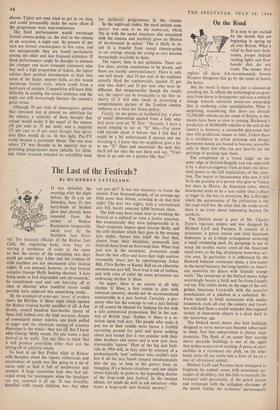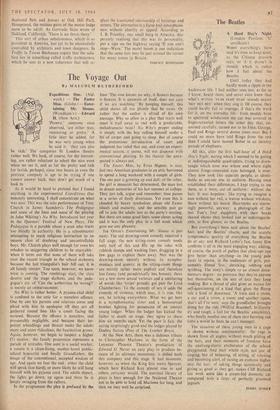On the Road
IT is easy to get excited by the motels that are beginning to spring up all over Britain. What a relief to find neat bath- rooms, proper bedside reading lights and floor boards that do not replace all those AA-recommended, brown Windsor dungeons that go by the name of hotels the better.
But the motel is more than just a cleaned-up coaching inn. It reflects the technological progres- sion from horse to horsepower and also a cultural change towards universal motor-car ownership that is rendering cities uninhabitable. What is surprising, considering that there are already 12,500,000 vehicles on the roads of Britain, is that motels have been so slow in coming. Buchanan's prediction of 40,000,000 vehicles at the end of the century is, however, a reasonable guarantee that they will proliferate sooner or later. Unless there is a revolution in urban planning and design, downtown hotels are bound to become accessible only to those few who can pay heavily for the privilege of parking near them.
The completion of a 'travel lodge' on the outer edge of Oxford (happily you can approach it by a dual-carriageway from at least one direc- tion) points to the full implications of this situa- tion. The tourist or businessman who uses it will be in the position of a person who goes to Venice but stays in Mestre. In American cities, where downtown tends to be a scar rather than a place to linger in, this has its attraction. But in Europc, where the quintessence of the civilisation is not the road itself but the cities that the roads serve, there is an irony about sojourning beyond the outskirts.
The Oxford motel is part of Mr. Charles Forte's vigorous empire and was designed by Michael Lyell and Partners. It consists of a restaurant, a petrol station and sixty luxurious bedrooms in an L-shape arrangement cornering a small swimming pool. Its parentage is not so much the modest motor court of the American small town, as the big, all-purpose motorway ser- vice area. In particular, it is influenced by the Howard Johnson restaurant chain, a late-corner to the motel business, but long familiar to Ameri- can motorists for diners with 'friendly orange roofs.' The restaurant at the Oxford motor lodge accordingly boasts a lurid and far-from-friendly red top. This settles down on the edge of the soft, golden limestone Cotswolds with the assertive nonchalance of a jukebox in a cathedral. Mr. Forte intends to build restaurants with similar trademark roofs all over the country and travel- lers will find them a useful reminder that regional variety in man-made objects is a dead duck in the .motorway age.
The Oxford motel shows also how buildings designed to serve motor-cars become subservient to them. Not that subservience is always inap- propriate. The flank of an ocean liner soaring above quayside buildings is one of the sights that makes ocean travel exciting. A posse of auto- mobiles in a restaurant car park, on the other hand, turns all too easily into a litter of tin on a mat of oil-stained asphalt.
Michael Lyell and Partners have attempted to fragment the asphalt ocean with occasional rec- tangles of shrubbery, but this fails to reconcile the transport cafe personality of the petrol station and restaurant with the collegiate character of the motel. Unlike the architects' picturesquely
deployed flats and houses at Oak Hill Park, Hampstead, the various parts of the motor lodge seem to be adrift. As Gertrude Stein wrote of Oakland, California, 'There is no there, there.'
This sort of urban nebulousness, which is so prevalent in America, has yet to be successfully controlled by architects and town designers. In Traffic in Towns Buchanan argues that the solu- tion lies in something called traffic architecture, which he sees as a new coherence that will re- place the traditional relationship of buildings and streets. The alternative is a loose-knit amorphous- ness without identity or appeal. According to J. B. Priestley, one small burg in America, des- perately realising that this was its personality, put a sign on the highway saying 'If you can't stop—Wave.' The motel boom is one indication that the same fate may be just around the corner for many towns in Britain.
TERENCE BENDIXSON











































 Previous page
Previous page